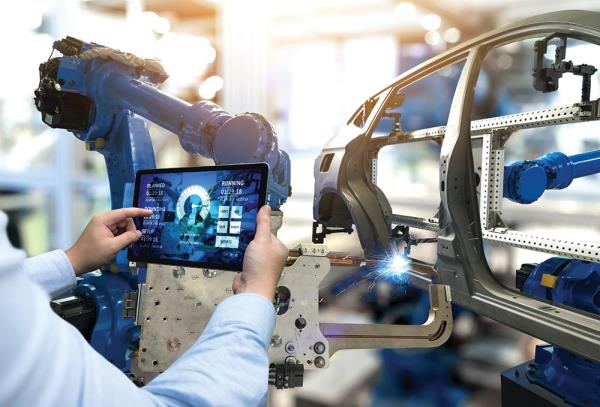04 September 2018

Research shows that manufacturers consider the role of software and IT in products as one of the top three factors affecting their businesses.
Smart products to add up to $685bn to manufacturing
The global manufacturing industry could expect to see between $519bn and $685bn in value-added revenue by 2020 through the development and sale of smart, connected devices.
That’s according to a new report by Capgemini’s Digital Transformation Institute. Its researchers surveyed 1,000 senior executives from global manufacturing organisations across Italy, India, China, Sweden, Netherlands, Germany, France, UK and US.
Manufacturers estimate that close to 50 per cent of their products will be smart and connected by 2020, a 32 percentage point increase from 2014. Eighteen per cent plan to stop manufacturing products altogether and move to a service-based business model.
Capgemini points out that a move in this direction will make the shift to a service-based model a business imperative and will require enhanced capabilities. It says that while digital investment has increased substantially since 2014, few manufacturers have been able to scale their efforts.
Around 50 per cent aim to spend more than €100m in product lifecycle management platforms and digital solutions in the next two years, while the proportion of IT budget earmarked for maintaining legacy systems has dropped significantly, from 76 per cent in 2014 to 55 per cent in 2017.
But around 66 per cent of survey respondents acknowledged that they constantly face two competing priorities: accelerating time-to-market by maintaining continuous product innovation and development of legacy products versus investing in smart, connected products.
Capgemini says its research shows that manufacturers consider the role of software and IT in products as one of the top three factors affecting their businesses, along with maintaining digital continuity and shifting from product to service-based business models.
It also says that if manufacturers are to capitalise on the smart, connected product opportunities, they will also need to improve on their IT and software skills competencies.
According to the report, 86 per cent of ‘novices’ do not have the sufficient availability, within their current capabilities, for data management; 95 per cent have insufficient skills for app design and 94 per cent for AI.
The firm adds that manufacturers will also need to capitalise on the data generated by connected products in their transition to selling services. It says usage of data from connected products, as well as customer feedback from social channels, is increasingly replacing traditional market surveys to fuel product and service innovation. Despite this, the report reveals that only a quarter are using data to deliver actionable insights for product innovation.

The firm says 31 robots will guarantee quality standards for its new VX25 enclosure system.
Rittal implements ‘Industry 4.0’ production
IT infrastructure specialist Rittal says it is currently building a “state-of-the-art” centre for manufacturing large enclosures based on so-called ‘Industry 4.0’ principles.
While work at the company’s Rittershausen plant in Germany is ongoing, the company is also installing new, high-tech production lines for its new VX25 large enclosure, at a total cost of €120m.
‘Industry 4.0’, also known as the fourth industrial revolution, is the result of accelerated advancements in digitisation technologies. AI, machine learning, automation, IoT, etc., are all part of the next phase of a transition that experts says will fundamentally change the way we live and work by weaving technology into every sphere of life.
Rittal says it is gearing up its production for Industry 4.0 through consistent digitisation of processes and fully automated profiling, welding and panel manufacturing units.
“Our goal is to establish the world’s most modern centre for manufacturing large enclosures,” says Carsten Röttchen, MD international production at Rittal. “With the increasing digitisation called for by Industry 4.0, we will be automating further sub-processes, increasing data consistency and integrating the production process into a completely digitised value chain through a manufacturing execution system.”
The plant already featured a high degree of automation in its sub-processes. Rittal says the new improvements include knowledge-based systems that are constantly evolving through data networking and analysis. It says this will enable the detection of trends in real-time by means of continuous target-to-actual comparisons of the production machines and statistical processes.
As a result, the firm reckons interference factors can be avoided before they occur and tolerances can be safeguarded in order to achieve the high quality demands of the process. In addition, predictive maintenance data is used to improve the technical availability of the production facilities.
The first units for the new VX25 large enclosure system, such as the fully automated panel lines for mounting plates, as well as the profiling and welding systems, have already been installed. When completed in 2020, the new production facility will have three profiling systems, each 70 metres in length. Rittal says this means that the VX25’s horizontal and vertical frame sections will be manufactured in one process.
The volume production lines also have fully automatic welding systems. Thirty-one robots will ensure that the transport and welding processes run reliably within the plant. Rittal says they will also guarantee quality standards for the VX25.
Rittal also plans to reorganise and expand its Chinese and US sites, focusing on digital transformation, and getting them ready for the future.










